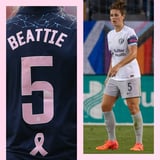What Happens When a Professional Athlete Is Diagnosed With Breast Cancer
 Get the Full StoryJen Beattie is a footballer to her core. The Bay FC defender, who transferred from Arsenal in February, started playing soccer in the Scottish Women's Premier League at just 15 years old. So when she was diagnosed with breast cancer in her late 20s, the thought of her soccer career coming to halt was "traumatic," Beattie tells PS.
Get the Full StoryJen Beattie is a footballer to her core. The Bay FC defender, who transferred from Arsenal in February, started playing soccer in the Scottish Women's Premier League at just 15 years old. So when she was diagnosed with breast cancer in her late 20s, the thought of her soccer career coming to halt was "traumatic," Beattie tells PS."I was 29 with no family history. It caught me completely out the blue," she says. Beattie was initially diagnosed after discovering a lump under her breast in October 2020. She told the Arsenal doctor at the time who then referred her to a specialist who would perform a biopsy and officially confirm Beattie's stage 1 diagnosis.
The entire experience felt foreign to her, Beattie says. "We're so accustomed to normal athlete injuries. You hurt your hamstring and you get an MRI, and you get told exactly what it is and how long it's going to take to rehab." With breast cancer, nothing felt intuitive. "I had no education," Beattie says. "I didn't really even know what a mammogram was or what the machine looked like or what a biopsy was," Beattie says.
Fortunately, her cancer care team allowed the Arsenal team doctor to attend appointments and treatments to take notes and relay the information to family, while her manager informed the team of Beattie's diagnosis.
"My teammates were absolutely incredible. They're the ones that got me through it. They're the ones that allowed me to talk about it when I needed to, or to just be Jen the footballer on different days. And for me, that was amazing mentally to just be able to still do my job for a large majority of the treatment," Beattie says.
The soccer star trained and played up until her lumpectomy, then she was out for about six weeks after surgery and had two weeks of radiation. "Getting outside every day and getting to run around and do my job helped in so many different ways, physically and mentally. It helped me just feel normal and escape from what I was going through."
"When you're going through something hard and your brain spirals to the worst-case scenario, it's so important to kind of keep it on track."
Beattie also started cancer-specific talk therapy during treatment and continued for six months afterward. Doing so helped her process some of the negative self-talk that would come up regarding success of the treatment, recurrence, etc. "To remain logical in that time was one of the most difficult things," Beattie says. The therapy she did was useful in keeping her thoughts grounded. "When you're going through something hard and your brain spirals to the worst-case scenario, it's so important to kind of keep it on track. So I found therapy to be massive," Beattie says.
Once Beattie got a grip on her own reality, she turned outward to see how she could help others cope and learn more about breast cancer and the possibilities of early-age diagnosis through organizations like Pink Ribbon Good.
"I've done a few walk and talks with patients that are going through treatment, where we go for walks outside to understand the health benefit of getting outdoors and walking and talking to your friends, and how much that can help offload some really tough stuff that's going on upstairs," Beattie says.
She's also been adamant about educating her teammates on the power of breast education, partnering with Sutter Health to bring a portable mammogram van and a team of nurses to give a breast health 101 talk. "They got a tour of the mammogram van, and just saw that what the machine was like, so that nothing's overwhelming. So that if and when they ever do need to go for a check or a routine checkup or a mammogram, they know what to expect," Beattie says.
Ultimately, "it's all one big learning curve" due to gaps in the education system, especially around early-age breast cancer and how to spot the signs, Beattie says. "It's such an important piece that we need to get in schools and to kids from an early age, because we as adults still don't know enough."
Alexis Jones is the senior health and fitness editor at PS. Her passions and areas of expertise include women's health and fitness, mental health, racial and ethnic disparities in healthcare, and chronic conditions. Prior to joining PS, she was the senior editor at Health magazine. Her other bylines can be found at Women's Health, Prevention, Marie Claire, and more.
Share: